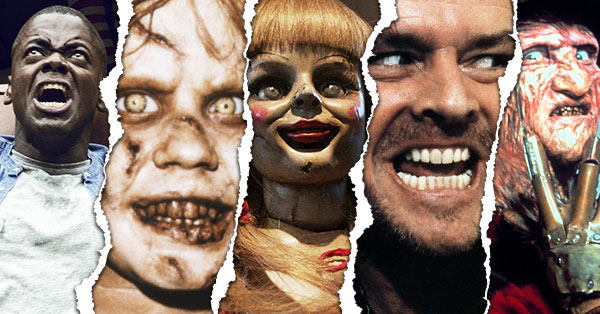The Psychology of Horror Movies
November 23, 2022
“Horror.” Just look at the word. Whether you like horror or not, there are certain strong emotions that are evoked. Perhaps it’s the bone-chilling, adrenaline-filled rush that one feels when experiencing this genre, or the pride felt when laughing off the seemingly traumatizing scenes. Maybe you’re just one of those people who hides behind their blanket and doesn’t sleep for a week because you’re scared a ghost is going to appear in your room at night. Horror can do things like this to us, so why don’t we ever ask ourselves: what’s so great about being afraid, anyway?
It’s a great question, and the meaning goes much deeper than we assume. What makes some of us enjoy this feeling of creepiness and suspense and others not? And what is it about horror movies that makes us feel this intense rush in the first place? It’s just a movie, it’s not real… so why do we get so afraid and what is it about this feeling of terror that attracts us to a horror movie?
Think of a scary movie. What is the first thing that comes to mind? Zombies? Ghosts? Monsters? Sure, those things are scary, but it just doesn’t make the sense of thrill so prominent when we know a lot of the plot and characters are made up. We may not realize it, but there are many aspects in a horror movie that make it seem like it’s real life; that it could actually happen. Mrs. Walters, who teaches a horror-writing unit in her Creative Writing class said, “There’s sort of a formula most movies generally follow to really make it scary. You have this eerie feeling that something’s about to happen. There’s usually something we would generally find comforting that is being manipulated.” For example, The Shining plays on the fact that a man, with his wife and son, is taking care of a hotel by himself during the winter. It seems as if there should be no problems because nothing or no one is there to bother the family and they’re just living everyday life; but we soon see that suspicious and unexpected happenings begin to emerge from the hotel.
But why do we enjoy watching horror movies when they evoke fear of the real world? Perhaps it could be of educational purpose for us, as mentioned in the 1987 article by Noel Carroll from The Journal of Aesthetics and Criticism. When we see that events in a horror movie could be real, we want to find out more; it opens up a whole new side of the world we may never have seen before. Plot twists and cliffhangers,, suggesting that the cycle of events in the movie never ends, serve to create a mystery that we, as viewers, want to solve. Sophomore students Kaylee Arau and Emma Schlacter suggested that “maybe you see yourself in a character or want to be like a character in the movie.” The nagging feeling where something bad is happening and the character isn’t doing anything to stop it makes you want to just jump through the screen into the character’s skin and save the day.
According to psychology and history teacher Mr. Conwisar, the reason that horror movies prove to be so effective is due to the Excitation Transfer Theory. In simple terms, this describes the feeling of suspense that contributes to our enjoyment of the horror genre. Furthermore, there are specific components that truly make up what fear is, and from these elements, creators can manipulate the audience, making for a truly effective horror movie experience. Some features include the fear of death, suspense, and the film’s soundtrack. Although death is inevitable, it does prove to be something that many fear. As Mr. Conwisar put it, “This is the ultimate fear, both existentially and psychologically. It isn’t really a horror movie if people don’t get killed.”
If the main factor of horror movies had to be boiled down into one term, it would be suspense. That is the main reason why the plot of horror movies is driven. During our interview with Oscar Hayes, we stumbled across an interesting point when he mentioned that the viewer gets a sort of adrenaline rush that connects them to the plot. Although he is not a huge fan of the genre, he did bring up the element of suspense. Interestingly, suspense was a theme that crossed the minds of all of our interviewees. It is the “key ingredient,” one said.
As Mr. Conwisar put it, “the best horror movies are full of suspense. Suspense involves creating anticipation that something bad will happen, but not knowing when it will occur. Some of the most shocking horror movie scenes create anticipation.” Another point to touch on is the use of the soundtrack of a horror movie. The best content from this genre comes from the immersion that it offers. This means the realism of the visuals, the emotions that the music can evoke and the general plot that offers the viewer a chance to participate in the story.
The Shining, a pioneering film in its genre, executes this very successfully. It was not your typical gore-filled, predictable horror, but was a movie that made its viewer feel the plot. One could feel the isolation of the hotel and the general cold feeling that developed as protagonist Jack Torrance slowly became taken over by the establishment. Simple scenes where Danny Torrance is roaming the hallways is not frightening in silence, but when paired with the shaky array of strings, it could have one yelling at the screen to turn the music off. As laughable as the special effects are, the auditory stimuli truly make each scene frightening. Mr. Conwisar stated, “music can create moods and elicit emotions. The music used in horror movies can be creepy, and can be used to accentuate the actions seen on the screen. Music intensifies feelings of suspense and shock.”
Among the interviewees, we managed to collect some recommendations that embody some of the elements of a captivating horror movie. Some titles include Silence of the Lambs, Jaws, Blair Witch Projects, The Shining, and The Exorcist (as suggested by Mrs. Walters). Each of these have distinct elements that make them as entertaining as they are. Jaws is a thrilling classic that takes a common fear — the ocean — and combines it with a deadly creature, sharks. Its gore-filled science makes the movie an enjoyable watch, with a triumphant ending that satisfies the viewer. The Silence of the Lambs is definitely the most intense watch on this list. It is the kind of psychological thriller that leaves even the most avid horror movie watchers in fear of Hannibal coming for them. Each detail is meticulously thought out, and the fact that the person we are supposed to confide in turns into the one we fear the most truly brings out a sense of interaction that the viewer craves. As previously mentioned, the main elements that contribute to the quality of a horror movie are suspense, the fear of death and the goal of corrupting what makes them very comfortable. Each movie manages to implement these requirements in a way. So, the next time that you watch a horror movie, become somewhat of a detective and be sure to look for elements that make this genre what it is.


















